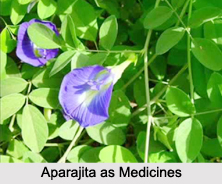 Aparajita is an ancient Indian medicinal herb. Its botanical name is Clitoria ternatea. According to Ayurveda, Aparajita is believed to be a Medhya drug which enhances memory and intelligence; it is also nootropic, anti-stress, anxiolytic, antidepressant, anticonvulsant, tranquilizing and sedative agent. The root of Aparajita is regarded as laxative and diuretic, and is generally used in combination with other medicines of the sort in ascites, fever, etc. Piles are cleaned with the decoction and the paste of whole plant is applied over it. Leaf juice is used as nasal drops in headache. Decoction is used for gargling in stomatitis and for cleaning wounds. It prevents pus formation.
Aparajita is an ancient Indian medicinal herb. Its botanical name is Clitoria ternatea. According to Ayurveda, Aparajita is believed to be a Medhya drug which enhances memory and intelligence; it is also nootropic, anti-stress, anxiolytic, antidepressant, anticonvulsant, tranquilizing and sedative agent. The root of Aparajita is regarded as laxative and diuretic, and is generally used in combination with other medicines of the sort in ascites, fever, etc. Piles are cleaned with the decoction and the paste of whole plant is applied over it. Leaf juice is used as nasal drops in headache. Decoction is used for gargling in stomatitis and for cleaning wounds. It prevents pus formation.
The following is an example of a prescription containing Aparajita root. Take the roots of aparajita, Pladera decussata (sankhini), Baliospermum montanum (danti) and Indigofera tinctoria (nilini) in equal parts, rub them together into an emulsion with water and administer with cow"s urine. This preparation is given in ascites and enlargements of the abdominal viscera.
This article is a stub. You can enrich by adding more information to it. Send your Write Up to content@indianetzone.com
Ayurveda
Ayurveda Medication
Elements of Ayurveda
Concepts of Ayurveda
Ancient Literature of Ayurveda
Sushruta Samhita
Classification of Medicine





